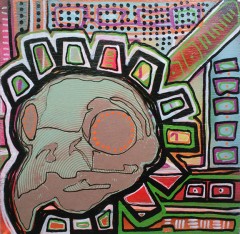Editorials Matt Spek Watson — August 6, 2013 11:04 — 0 Comments
The Monarch Drinks With J Pinder
J Pinder: I was in the studio with Game, and I was just there because I was supposed to play him some records. I played him some records and he liked what he heard. So he was like, ‘Write this verse,’ and he started playing me a song. And I hated the song. So I thought, I don’t want to be on this, but I need to be on this. I should be on this. It could do wonders for my career. But I care about my artistic integrity, so how do I pull this off?Â
Spek:Â So, did you do it?
J Pinder: I didn’t. I didn’t.
Though hiphop is approaching its 40th birthday, it remains a young man’s game, an industry built on short-lived hype and experiments in the art of hustle, where the creative marketers often overshadow the creative artists. And while Seattle’s J Pinder recognizes that most of his peers are focused on building a buzz, he seems laser-focused on building a lasting career on his own terms. “I’m not necessarily interested in making a hit record or having a whole bunch of money in my pocket,†he says. “It’s more about learning, because I see myself more as a producer most of the time.â€Â He is an artist with a clear vision of himself and his art, and now he finds himself on the cusp of mainstream success, trying to maintain that vision amidst the distractions of the music industry.
I met J Pinder last month at Petti Rosso, a pretentious but tasty little restaurant on Capitol Hill. He was in town for the weekend to shoot a video directed by Bean One, for the Vitamin D produced song, “Loaded Gunâ€, which premiered last week on XXL.com. He ordered a grilled cheese, I drank tequila, and we talked about the rap game and Pinder’s place in it, where he was headed and how he felt about his recent successes. He struck me as confident, intentional and careful with his words, but also not surprised at the results of his hard work. “Growing up, I’ve always had in my mind that I’m supposed to be in a certain place in the things that I succeed in or the goals that I go after, so I think I take for granted the situations that I’m in, or the people I end up being around.â€
J Pinder has spent the last several years building on the foundation established in Seattle by his mentors, Vitamin D and Jake One, putting together a tight-knit team of managers and producers, who have been able to craft a cohesive sound while introducing him to some of hiphop’s most established artists. He has toured with Talib Kweli and Slum Village, collaborated with Marsha Ambrosius and Musiq Soulchild, and has been on video shoots with Ras Kass. All impressive accomplishments that appear right in line with the narrative we expect from a successful up-and-coming rapper in 2013.
So, when I sat down to talk with him, I expected to hear excited stories about his recent collaborations and newfound successes. Instead, I met a man who, while aware of how far he’d come in the last few years, was frustrated by his experiences in the mainstream music industry. He seems to have learned that, for an artist like him, who is able to confidently articulate a vision for his career, the industry is not a means to success but an obstacle to be overcome. “There’s a huge difference between making underground music and mainstream music. When you make mainstream music, it’s your job. It’s your job first, before everything. There are schedules, there are expectations, so you don’t have as much time to be creative and think and do things the way you would want to do them. I mean, Busta Rhymes calls and says he needs a verse and he needs it in an hour, there’s just no time to do it the way I usually like to do it. And that’s one of the things that I’ve been struggling with. Do I want to play to the industry or do I want to play to my heart? And if my fanbase were to really accept that and grow with that, then it would be possible to do, but it’s very hard to think like that and support yourself through it. There are a lot of compromises to be made.â€
Which is why, despite his seemingly traditional career trajectory, Pinder has taken steps to maintain as much control over his art as possible, giving himself options outside of the mainstream. He uses a small number of producers on his records, and adds orchestration to the tracks as he sees fit. His social media accounts do not pander to his fanbase, but are instead littered with pictures and clues about his upcoming work. But nowhere are Pinder’s attempts to maintain his artistic integrity more clearly illustrated than his deal with Fin Records, an alternative Seattle label. Pinder was the label’s first hiphop act, and their agreement gives him complete autonomy over his release schedule, while also providing him with touring and promotional opportunities that elude most rappers. “Fin isn’t a traditional label, they don’t want to sign people and tie them down. We have a partnership and we want to provide opportunities for each other. And they’ve definitely been able to open a lot of doors.â€
What struck me most about my conversation with J Pinder was his ability to balance confidence with a willingness to be candid about the uncertainty of his career. Every move he makes seems to be an intentional part of his plan, but he has seen enough of the industry to know that plans don’t always work out, and the most successful artists are the people who are able to adapt and make sacrifices. He moved to Los Angeles last August, and while the move has led to some life-changing opportunities, they come at the cost of leaving the creative culture of Seattle, which he has depended on for much of his inspiration. He’s also gearing up to release a new record in conjunction with the legendary DJ Jazzy Jeff, which is a record that might mark a turning point. “This EP is pretty much my attempt to get people to really buy into what I do right now,†he says, signaling that he has considered adapting his sound in the future if that’s what it takes to see success. “I might have to sacrifice some of my vision, just to reach a larger audience. But I think that’s misunderstood a lot. Art is art, and if you’re a good artist you’ll create your art in a way that works.â€
All this brings us back to his story about being in the studio with Game. I asked him if he had any regrets about turning down an opportunity that most rappers would kill for, and without hesitation he nodded, “Aftermath and Interscope run you through tests, and I was basically being vetted by Interscope A&R, and that was the first test. And I wasn’t aware of it. I didn’t know. I was just there, I never thought I was being watched. Later on, one of my mentors told me that it was a test, and I said, ‘What about artistic integrity?’ and he was like, ‘You’ve gotta shoot that shot.’ And that’s the difference. The difference between being an artist, and trying to make music in this industry.â€Â It was interesting that what I interpreted as a moment of courage and strength, he had come to accept as a moment of weakness. I asked him if he thought it was possible to ever reconcile those two feelings without sacrificing his integrity as an artist. “Anything is possible. It’s just a matter of time. And it’s a matter of figuring out how much time I have to keep doing this.â€
Walking home from my interview with Pinder, I was excited to write an open-ended story about an artist on the cusp of success. I had plans to end the article with a bunch of will-he/won’t-he questions about where his career would end up in the next year. Would his stalled collaboration with Game end up tarnishing Interscope’s view of him? Would Fin Records’ inexperience in the rap game prove to be a boon or a detriment to Pinder’s ability to build an audience? Would he be able to find the kind of creative space in Los Angeles that he’d found in Seattle? He didn’t have answers to these questions, and neither did I. But I thought it’d be a fine way to wrap up the article given all his uncertainty.
But a few days ago he posted this picture (below) to his instagram account. I guess now the only question is, when do we get to hear what these two have been working on?
The answer isn't poetry, but rather language
- Richard Kenney





